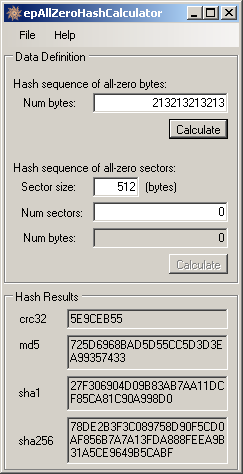

Hash calculator 1016 64 bits#
The Anssi specifies that spaces of less than 64 bits must be considered as very small, as weak those between 64 and 80 bits, as medium those between 80 and 100. It is even recommended a size of at least 128 bits if you want the security to be ensured for several years. When it comes to passwords or secret keys for encryption systems that you absolutely want to be secure, she advises only using spaces of at least 100 bits. The National Information Systems Security Agency (Anssi) advises on these issues. We also talk about 29-bit entropy, or 75 bits. For the first example, the measurement gives 29 bits, and for the second 75 bits. This number is given by the formula 1 + integer part (log2 (N)). To measure the size of these spaces, it is common to count the number of binary digits of the number N of possibilities. If it took your computer a second to visit the first space, it would take two million years for it to examine each of the passwords in the second space: the proliferation of possibilities has made some possible operations on the first space impractical. Considering all the passwords in the second space one at a time will take 62 trillion times longer. This is over 62 trillion times the size of the first space.
Hash calculator 1016 password#
If you choose a password of 12 characters taken from upper case, lower case, 10 digits and 10 symbols & é §? ç ù œ / + =, there are 72 possibilities for each of the 10 signs of the word the space of possibilities is then 7212, that is to say:ġ9 408 409 961 765 342 806 016 ≈ 19 × 10^21. If you choose 6 lowercase letters for your password, for example “afzjxd”, “uncle”, “secret”, “These choices are independent, you are not required that all letters be different, and therefore the size of the password space is the product of the possibilities, which gives 26 × 26 × 26 × 26 × 26 × 26 × 26 = 26^6. When you are asked for a password, it falls within a certain space of possibilities, the size of which you should be aware of. To fully understand all this, is a little common sense enough? Nay! Do you know why 6 characters are not enough for a good password and why you should not use all lowercase letters? Did you know that there are methods of indirectly storing passwords on a computer server which, even if visited by a hacker, will prevent the hacker from profiting from what it finds? Did you know that between “doing a lot of calculations” and “memorizing a lot of data”, you can find compromises and thus succeed in breaking passwords that would otherwise be inaccessible? Understanding all of this will be our goal. It is also necessary to give up using the same password on several websites, to change it regularly and… not to forget it. Among the advice given was not to write down passwords on a piece of paper next to the computer. Often, when we choose a password, the system refuses it, telling us that our choice is too simple and that annoys us. We all use passwords to protect our accounts, email, access to particular sites, computers, phones, etc. Choose passwords, keep them while protecting them, succeed in revealing them: the science of passwords is a treasure trove of subtleties.


 0 kommentar(er)
0 kommentar(er)
